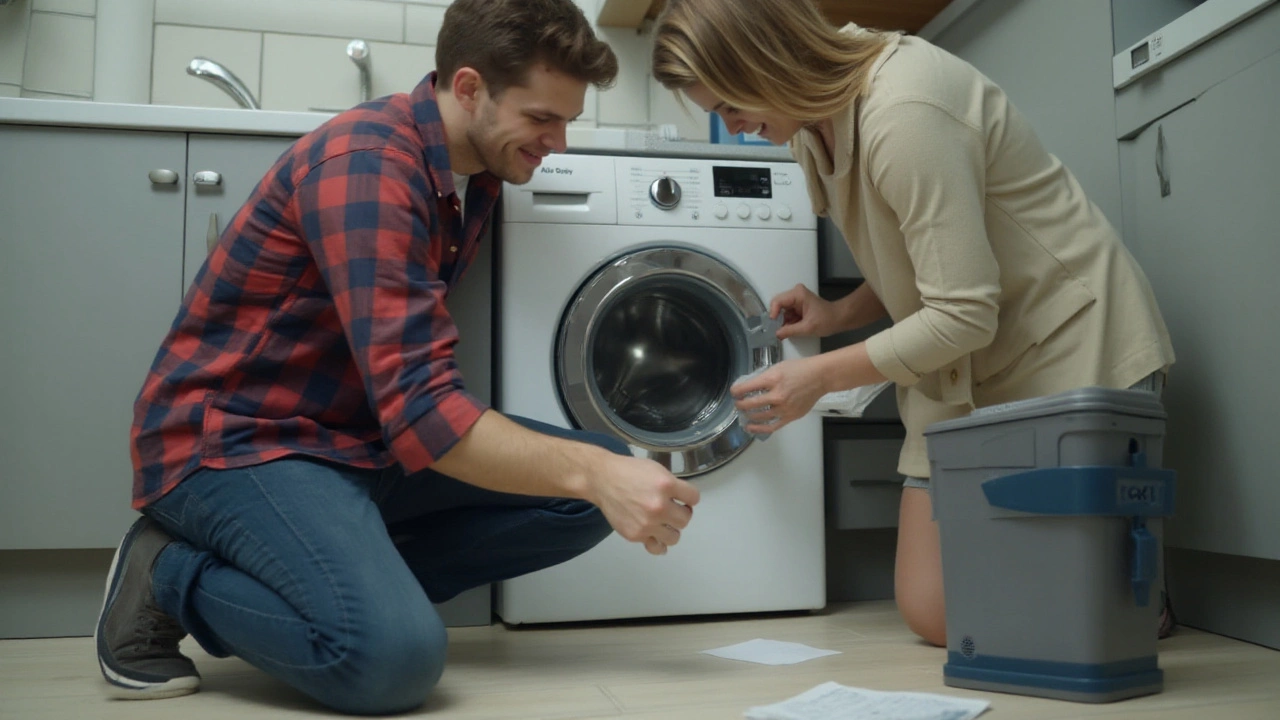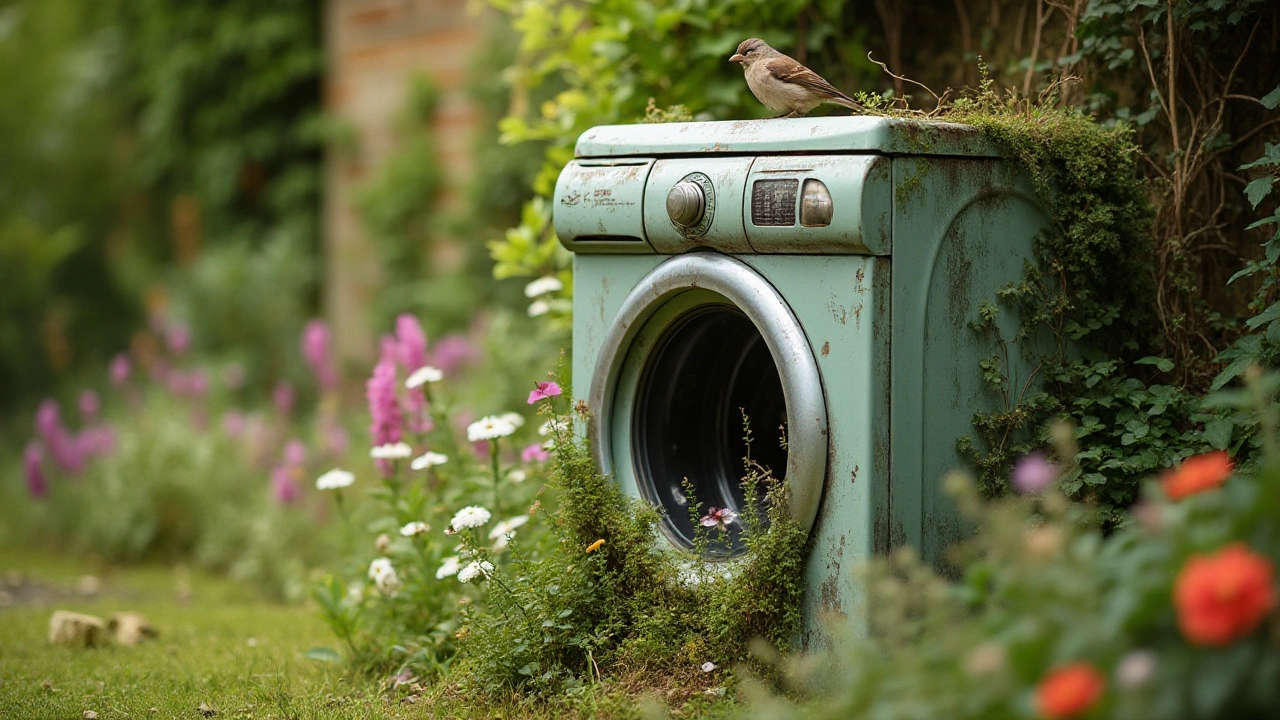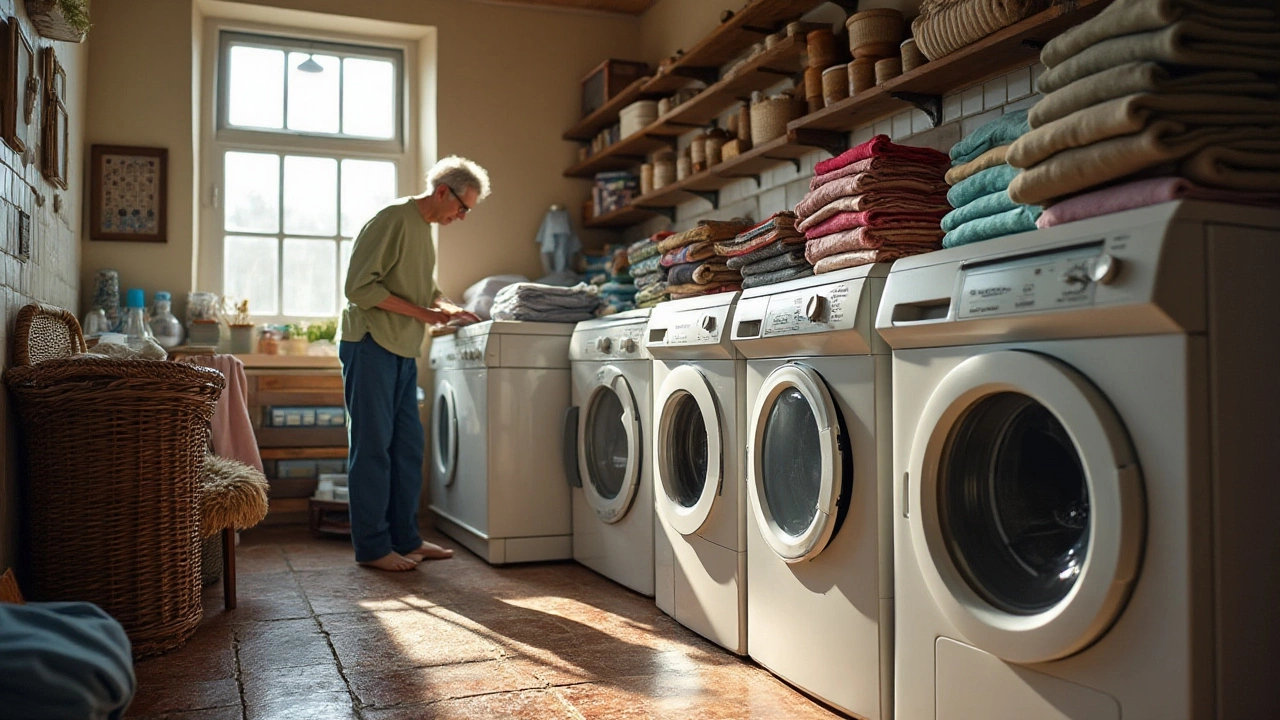When you first invest in a washing machine, the hope is for it to serve you loyally for many years. But how many years should you realistically expect? The answer can hinge on a variety of elements, from how often you use it to the kind of maintenance you perform.
Typically, a good washing machine will clock in around 8 to 12 years of service before thoughts of replacement start tapping on your shoulder. Yet, not all washing machines are created equal. Factors like the make and model, frequency of those laundry loads, and even the water quality in your area can play significant roles in determining your machine's lifespan.
- Lifespan of Modern Washing Machines
- Factors Influencing Longevity
- Signs Your Washing Machine Needs Attention
- Maintenance Tips for Longevity
- When to Repair or Replace?
- Choosing a Durable Washing Machine
Lifespan of Modern Washing Machines
Washing machines, like any beloved household items, come with their own expiration dates. The notion of their lifespan isn't just plucked from thin air but is based on engineering and usage patterns that have been observed over time. The expected longevity of a washing machine typically falls between 8 to 12 years. This timeframe gives a good baseline, but as with many appliances, factors vary greatly. Such variability can be attributed to usage habits, technological advancements, and of course, the brand itself.
Consider the washing machine lifespan like this: imagine your washing machine as a car. A sports car might offer a thrilling driving experience, but maintenance is critical, and it's not the choice for endless mileage without upkeep. Similarly, high-end or energy-efficient washing machines come with their own set of care instructions which, if followed properly, can stretch that 12-year mark even further. Interestingly, many people fail to realize that front-load washers generally have a longer lifespan compared to top-load washers, although they might be more expensive upfront. This can be attributed to fewer vibrations and less mechanical stress during operation, enhancing their durability.
Manufacturers today build machines under increasingly stringent standards. The evolution from purely mechanical systems to digitally enhanced ones means modern machines are often equipped with sensors and advanced washing programs capable of optimizing water and energy usage. Not only does this boost efficiency, but it also potentially extends the machine’s life by avoiding unnecessary wear and tear. That said, it's a two-way street—while smart features are dazzling, they require a certain level of technical maintenance or software updates to maintain their prime function, much like your smartphone.
Catherine Savard, a household technology analyst, once remarked, “The key to longer machine life isn’t just technology but understanding. Treat your appliances like a partnership—know them well, and they’ll keep performing.”
Interestingly, statistical insights suggest that an increase in planned obsolescence in some manufacturing processes can peg the longevity of appliances back. A study showed that currently, around 60% of consumers expect their large appliances to last over 10 years, yet slightly less are prepared for frequent repairs. It’s a topic that eco-conscious consumers are beginning to consider more seriously, prompting questions on sustainability and value for money.
Factors Influencing Longevity
When it comes to determining how long your trusty washing machine will last, several crucial factors play their part. Imagine your washing machine as an athlete — a marathon runner needing proper care and conditions to maintain peak performance. The type of washing machine, frequency of use, and how well you maintain it can all sway its lifespan. Let's dive into these factors to better understand their impact.
First up is the type of washing machine you own. Front-load washing machines, for instance, typically have a longer lifespan compared to top-load models. This is often due to their sophisticated design, which causes less wear and tear on the machine's components. However, this isn’t a hard and fast rule. Differences in build quality, manufacturing materials, and technological innovation can also play significant roles. Some brands have sterling reputations for producing durable machines, while others might churn out a host of repairs down the line.
The frequency of use is another big player in how long your washing machine will keep running efficiently. Households running loads multiple times a day put more strain on the appliance, potentially reducing its service career. Think of it this way, the more workloads you throw at it, the more you diminish the lifespan of modern washing machines. Appliance experts often liken this to running a car engine constantly — less time off means quicker to wear out.
"Maintenance is key," says John Darling, a notable appliance repairman with over 20 years of experience. "Simple routines like cleaning the drum, using the right detergent, and not overloading can add years of life to your appliance."
Speaking of maintenance, it's one of the easiest ways to extend the longevity of your washing machine. Routine checks and clean-ups can prevent minor issues from snowballing into major breakdowns. Regularly cleaning the lint filter, maintaining the detergent drawer, and checking hoses for leaks or cracks can make all the difference. Ensure that the machine is level during operation to avoid putting unnecessary stress on its parts. Remember, what you put in matters too — be it types of detergent or the amount.
Environmental Factors and Machine Placement
The environment your washing machine resides in also affects its lifespan. Hard water, which contains a higher concentration of calcium and magnesium, can wreak havoc on washing machines over time. It leaves residue and soap clogs that impact efficiency and build-up can lead to costly repairs. Installing a water softener could be a wise choice if your area is known for hard water.
Where you place your machine in your home can matter too. Machines in damp basements might suffer from rust and electronic issues quicker than those in dry, ventilated laundry rooms. Ensuring the washing area is properly set up to control humidity and prevent physical damage is critical.
Quality and Cost Considerations
Ultimately, the old adage "you get what you pay for" can ring true here. Investing in a high-quality washing machine might entail a larger upfront cost, but can save on repairs and replacement expenses in the long run. Often, pricier appliances come with extended warranties or better after-sales support, offering a safety net for when issues do arise. Pay close attention to reviews and dependability scores before purchasing, as choosing wisely at the start can mean fewer headaches and a longer lifespan.
Taking these elements into account can significantly sway the durability and effectiveness of your washing appliance. Whether it's through consistent washing machine maintenance or making informed purchase choices, understanding these factors can make all the difference between enjoying a decade-long relationship with your washer or dealing with frequent mechanical meltdowns.

Signs Your Washing Machine Needs Attention
While washing machines are designed to endure years of service, they are not immune to problems that arise with repeated use. Being mindful of your machine's performance can save you time, money, and the inconvenience of unexpected breakdowns. A good starting point is to understand what signals might indicate that your appliance requires repair or maintenance. A common sign is when your washing machine makes unusual noises that differ from its usual operational sounds. A banging, clanging, or grinding noise could indicate something as simple as a foreign object caught in the drum or as severe as a failing motor.
Another noteworthy sign is water leakage, which is more than just an inconvenience; it can harm the machine and your flooring. Leaks could arise from worn-out seals, hoses, or a malfunctioning pump. It's essential to regularly check for any pooling water around your washer or unexpected wet spots after use. You might find that your clothes are not coming out as clean as they used to, which could be a sign that your machine's cleaning performance is declining. This often points to potential issues with the water inlet valve or blocked detergent dispensers.
Pay attention to any prolonged washing cycles. If your usual wash takes significantly longer, it could suggest a problem with the timer or the machine's ability to fill, drain, or spin correctly. An important yet often overlooked sign is excessive vibration during the spin cycle. Although some movement is normal, when it becomes intense and causes the machine to shift from its original position, it may indicate issues with balance or worn shock absorbers.
According to Consumer Reports, "Many repairs are more cost-effective than a full replacement, and knowing the common warning signs can guide whether to call a professional."
For some, the digital display or control panel lights offer straightforward clues. Error codes and blinking lights can often guide you to the specific problem area, as outlined in the machine's user manual. Malfunctioning control panels can also suggest electrical issues within your appliance. Identifying these signs early can be pivotal in mitigating further damage. At times, such issues may require immediate professional intervention, while others might be manageable in consultation with your user manual.
Maintenance Tips for Longevity
Taking proper care of your washing machine can significantly extend its lifespan and keep it running efficiently. A crucial step in maintenance is giving it a regular check-up, much like a doctor’s appointment, to ensure all parts are in working order. This involves looking for any signs of wear and tear, like strange noises or leaks, which could indicate a potential issue. If caught early, these problems can often be addressed before they mushroom into major repairs, thereby saving you time and money. Simply paying attention to how your machine sounds and performs during each cycle can offer invaluable early warnings.
One of the simplest yet most overlooked maintenance tips is to avoid overloading your washing machine. Although it might be tempting to cram everything in one load to save time, overloading can actually cause excessive strain on your machine’s motor and drum. This not only reduces its effectiveness but also shortens its overall lifespan. By adhering to the manufacturer's recommended load size, you help maintain the machine's durability. Speaking of maintenance, cleaning the lint filter regularly is another important task. While not all washing machines have them, those that do benefit from lint being kept to a minimum, ensuring water flows freely and no residual debris lingers in the machine.
Ensuring the washing machine is perfectly leveled is vital for smooth operation. If it rocks back and forth during use, it could lead to significant wear on internal parts. Adjusting the feet of the washing machine can align it properly. A stable machine functions more quietly and reduces the risk of components loosening over time. Perusing the user manual can offer great insights here, often including how to balance the machine correctly and detail the washing machine maintenance schedule you should follow. The manual sometimes goes unnoticed on a bookshelf, but it’s one of the best ways to proactively prevent missteps.
Water quality can subtly influence the longevity of your appliance. Hard water, in particular, can leave mineral deposits inside the machine that might cause blockages or reduce efficiency. Consider adding a water softener to your system or using descaling solutions specifically designed for washing machines once every few months. These measures help maintain machine efficiency and prevent buildup that can lead to wear and degradation. Additionally, using appropriate detergent quantities is vital. Too much detergent creates excessive suds, which can lead to more debris and even damage to sensitive sensors.
Routine Internal Cleaning
Running an empty wash cycle with hot water and a suitable cleaning agent can do wonders for your machine. This should be part of your monthly washing machine maintenance routine. The cleaning agent helps remove built-up residues from detergent and fabric softener usage that can accumulate over time. Encrusted buildup can damage internal components if left unchecked, not to mention potential impact on odor. Bleach or vinegar can be good choices here, but always check your machine's manufacturer recommendations to avoid damaging your specific model. The result? A cleaner, more efficient machine and fresher-smelling laundry.
As we’ve demonstrated, just a few proactive measures can significantly lengthen the lifespan of your washing machine. These steps not only prevent unexpected breakdowns that can throw a wrench in your laundry routine but also help maintain a more energy-efficient operation. Think of it as an investment in fewer repairs and a potential reselling point if you decide to upgrade in the future. As always, if you find something you’re unsure about, don’t hesitate to reach out to a professional for advice. It’s always better to ask than to find yourself elbow-deep in a machine wondering what's wrong.

When to Repair or Replace?
Facing the decision of whether to repair or replace your washing machine can be daunting. An essential factor to consider is the age of your machine. If your washer falls within the typical lifespan of 8 to 12 years but is leaning towards that higher end, it may be more economical in the long run to explore replacement options, especially if repairs become too frequent or costly. On the other hand, if the appliance is relatively new, a repair might make more financial sense. Consider the cost of the repair; if it exceeds 50% of the price of a new machine, this is often a benchmark tipping point where replacement is advised.
Next, assess the severity and frequency of the issues you're encountering. A simple fix might be advisable for minor problems such as a clogged filter or a damaged hose. However, persistent issues like a faulty motor or drum problems, more intricate and expensive to fix, could indicate it's time for a new machine. Regular maintenance and awareness of such signs can prevent small issues from snowballing into larger problems.
Considering energy efficiency is also wise. Newer washing machines often come with energy-saving features that can substantially reduce your utility bills over time. If you're using a model that predates these advancements, replacing your machine can actually save money in the long haul. Additionally, environmental impacts should be weighed; newer models are typically more eco-friendly, using less water and energy.
According to Consumer Reports, "Most experts recommend replacing any appliance over 10 years old, when faced with a costly repair, as they may become more unreliable and inefficient.”
The availability of spare parts for your specific model is another criterion. As a machine ages, parts become scarce, making repairs not just pricey but sometimes impossible. A machine needing frequent part replacements may signal that a new machine would be a more reliable choice. Lastly, don't underestimate convenience and peace of mind. Dealing with regular breakdowns can disrupt your daily routine; opting for a new machine can alleviate this stress and offer better reliability, leaving you more time to do what you love.
Choosing a Durable Washing Machine
When it comes to selecting a durable washing machine, the process can feel akin to finding the right partner. You seek reliability, performance, and a machine that will hum along smoothly for years to come. The choices can appear overwhelming with various brands and models flooding the market. However, by focusing on a few critical aspects, you can steer your decision towards one that will not only meet your needs but exceed them.
To start, consider the brand reputation. Companies like Whirlpool, LG, and Bosch have been crafting washing machines for decades, gathering a solid fan base due to their track record of durability. Look specifically at models that have received high ratings for their longevity. It might also be beneficial to delve into user reviews and consumer reports, as they can provide candid insights into how these machines stand the test of time. An interesting piece of information I stumbled upon stated that models with fewer electronic features tend to have fewer issues over time due to fewer parts that can malfunction.
Another vital factor is the material. Stainless steel drums, as opposed to plastic ones, tend to hold up much better over time. They withstand higher spin speeds and are less prone to cracking, a concern especially when dealing with larger loads. This can make a significant impact on the washing machine lifespan. Checking the Energy Star rating is also a good move, as machines that are energy-efficient generally see less wear, which implicitly extends their lifespan. From a financial viewpoint, they also help reduce utility bills, hence adding value over time.
According to Consumer Reports, "Front-loaders perform better than top-loaders at cleaning, extracting more water, and generally using less water and energy." This emphasizes why front-loaders are often the choice for those looking for durability and effectiveness in one package.
Lastly, don't overlook the warranty. A longer warranty can be a great indicator of the manufacturer's confidence in their product. Typical warranties range from one to three years, but some brands offer extended plans that cover up to five years. Be sure to check what parts and labor are included. A durable washing machine is often reflected in the warranty coverage it holds. For families with high laundry demands, such warranties can offer peace of mind.
Remember, the upfront cost shouldn't be the only consideration. While pricier models may give you pause at first, their sturdiness can often justify the expense in the long run. Think of it as an investment, one that, if chosen wisely, will keep those clothes looking their best effortlessly for the better part of a decade or more.

I am an expert in the services industry with a focus on appliance repair. My passion lies in understanding how things work and educating others in simple, engaging ways. This enthusiasm fuels my writing, where I delve into topics around appliance maintenance and troubleshooting. I aim to make these subjects clear and accessible to all readers.